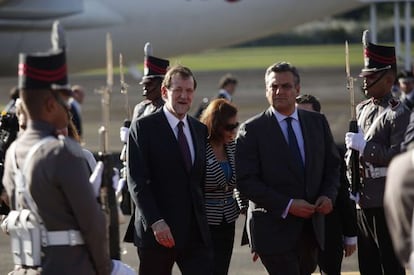Ibero-American Summit loses its gloss as leaders stay home
Many empty chairs in Panama City due to health issues and schedule conflicts

This year's Ibero-American Summit — which was expected to be an important meeting designed to re-establish its foundations and principles — lost much of its steam as it kicked off on Friday with 14 of 22 regional leaders canceling their appearances in Panama City.
This is the first time that King Juan Carlos has missed the summit; taking his place while he recovers from hip replacement surgery is his son, Prince Felipe. Prime Minister Mariano Rajoy and the Portuguese president and prime minister, Anibal Cavaco Silva and Pedro Passos Coelho respectively, are also attending.
The summit was also to include in its agenda an unprecedented push by some leaders to open a regional dialogue on decriminalizing some recreational drugs. But that issue also fizzled out when one of Latin America's biggest proponents, Guatemalan President Otto Molina, announced on Thursday that he won't be attending the two-day summit. Also absent was Bolivian President Evo Morales, who has also been urging global leaders to recognize his country's heritage in growing and harvesting coca leaves.
Argentinean President Cristina Fernández de Kirchner also stayed away as she recovers from surgery she underwent last week to remove a blood clot near her brain. The leaders of Venezuela, Nicolás Maduro; Ecuador, Rafael Correa; Chile, Sebastián Piñera; Uruguay, José Mujica — who did not attend last year's summit in Cádiz — and Cuba, Raúl Castro, canceled for health reasons or schedule conflicts. The latter excuse appears to demonstrate the lack of importance given to the summit by many regional leaders.
Latin America leaders who are attending don't carry enough weight to make up for the others who are absent
Those Latin America leaders who are attending — Colombia's Juan Manuel Santos, Peru's Ollanta Humala and Mexico's Enrique Peña Nieto — nevertheless don't carry enough weight to make up for the others who are absent. Peña Nieto has his own special interest because he will be hosting next year's summit in Veracruz.
Last year in Cádiz, the leaders made a firm commitment to invigorate future summits and change their course. But that task is expected to be difficult this year because of the absence of such regional heavyweights as Chile and Bolivia.
Still, the leaders and representatives of the 22 nations are expected to debate a call made by former Chilean President Ricardo Lagos to reform the organization while also discussing proposals to hold meetings every two years and prevent them from coinciding with the annual European Union-Latin America summits.
Financing is another issue on the agenda. The leaders and representatives will discuss a new cost-sharing model to finance the Ibero-American Summit's secretary general's office. Since the first summit was held in 1991, Spain has assumed 60 percent of the costs while Latin America contributes 30 percent and Portugal the remaining 10 percent. The new proposal calls for Latin America's contribution to be raised to 40 percent.
Tu suscripción se está usando en otro dispositivo
¿Quieres añadir otro usuario a tu suscripción?
Si continúas leyendo en este dispositivo, no se podrá leer en el otro.
FlechaTu suscripción se está usando en otro dispositivo y solo puedes acceder a EL PAÍS desde un dispositivo a la vez.
Si quieres compartir tu cuenta, cambia tu suscripción a la modalidad Premium, así podrás añadir otro usuario. Cada uno accederá con su propia cuenta de email, lo que os permitirá personalizar vuestra experiencia en EL PAÍS.
¿Tienes una suscripción de empresa? Accede aquí para contratar más cuentas.
En el caso de no saber quién está usando tu cuenta, te recomendamos cambiar tu contraseña aquí.
Si decides continuar compartiendo tu cuenta, este mensaje se mostrará en tu dispositivo y en el de la otra persona que está usando tu cuenta de forma indefinida, afectando a tu experiencia de lectura. Puedes consultar aquí los términos y condiciones de la suscripción digital.









































